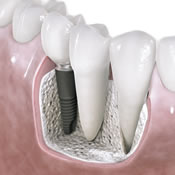Frequently Asked Questions
Dental Implants to Replace Missing Teeth

What is a Tooth Implant or Dental Implant?
A tooth implant, or dental implant, is a titanium replacement for a tooth root. It is inserted into the jaw to hold a false tooth, bridge or denture in place.
How Do Dental Implants Work?
A dental implant is inserted into the jaw under the gum. The implant is usually left to fuse with the jaw bone before a false tooth is fitted. This process is called osseointegration. It produces a secure bond between the tooth implant and the surrounding bone.
Are Dental Implants Very New?
The first modern dental implant was placed in 1965. The design and materials have been much refined over the last 40 years with increasing success rates. Dental implants became widely available from the 1980s and millions have been successfully placed since then.
Is Dental Implant Treatment Safe?
Dental implants have been used in clinical practice for many years. The materials have been rigorously tested. There are always risks with any surgical procedure. These partly depend on the patient and the operator. The pros and cons should be discussed with the implant dentist during the clinical consultation.
How Long Do Dental Implants Last?
Tooth implants can last a lifetime, provided good oral hygiene and good general health are maintained. The crown, bridgework or denture they support may need replacing, due to normal wear and tear.
Patient Suitability for Dental Implants

Who is Suitable for Dental Implants?
Most people can have dental implants, provided they have a healthy mouth and good general health. Tooth implants are not normally offered to young people whose jaws are still growing. Smoking and drinking alcohol can increase the risk of implant failure. There are also a number of medical conditions which can give an increased risk. These are discussed with each individual patient at the initial consultation.
How Can I Find Out if I am Suitable for Dental Implants
In short, consult one of our implant dentists. To assess whether you are suitable for tooth implants, the implant dentist will carry out a thorough clinical consultation. This will include a check of your medical history, a complete examination of your mouth and x-rays. You should discuss the treatment options with the dentist, who will provide you with a written treatment plan, including costs.
Do I Need to Have a Healthy Mouth for Dental Implant Treatment?
A healthy mouth is vital to the long-term success of teeth implants. Any dental problems, including gum disease, decay or other infections will need to be treated before the implants are placed.
Can Dental Implants Always be Used to Replace Missing Teeth?
Whether a patient can be treated with tooth implants depends on their general oral health and the amount of bone in the jaw. The implant dentist will carry out tests to check bone health and volume. If there is not enough, then bone grafting may need to be considered.
What are the Alternatives to Dental Implants?
If the tooth root is infected, root canal or endodontic treatment may be possible. Where a healthy tooth is still in place, it can be fitted with a crown without the need for a dental implant. For missing teeth, the alternatives are a gap, a bridge or dentures.
How do Dental Implants Compare with Other Options?
Dental implants can provide a permanent replacement for missing tooth roots. The treatment is a cost-effective long-term investment. Bridges and dentures are cheaper in the short term, but have some disadvantages. Fitting a bridge usually involves removal of healthy material from adjacent teeth. The bone beneath a denture shrinks because it is not being used and chewing pressure reduces the blood supply. Dentures can be uncomfortable and cause problems with eating and speaking. Both Bridges and Dentures will need replacing.
Tooth Implant Treatments

What Kinds of Dental Problem can be Treated with Dental Implants?
Dental implants can be used to fill a single tooth gap, to replace multiple missing teeth or a complete set (known as a full arch) upper or lower. A single missing tooth can be replaced with a crown fitted to a dental implant. If you have two or more missing teeth, an implant-supported bridge could be used or multiple single implants and crowns.
If you have no teeth left there are two main options - a full arch bridge fixed in place using tooth implants or a conventional denture secured by two or more implants.
If you have no teeth left there are two main options - a full arch bridge fixed in place using tooth implants or a conventional denture secured by two or more implants.
How Many Teeth Can be Supported by Implants?
A single missing tooth needs one dental implant to replace it. If you have lost two or more adjacent teeth, you do not necessarily need an implant for every tooth. Dental implants can support a number of artificial teeth either in a bridge or denture. Four to six implants are usually needed to support a full top or bottom set.
Can a Dental Implant be Used to Replace One Tooth?
A single dental implant and crown can normally be used to replace one missing tooth. An implant-supported crown looks and functions the same as a natural tooth. A major advantage, when compared to a conventional bridge, is that it does not involve any damage to the adjacent teeth. Filling the gap prevents undesirable movement of the adjacent and opposite teeth. To find out more, the next step is to arrange a consultation with an experienced implant dentist.
What if I Have No Teeth Left?
If all of your teeth are missing, there are two main options with dental implants:
Option1: A denture held in place by at least two tooth implants
If you already wear a denture, it can be prevented from moving around by implant locator clips. The denture can continue to be worn and removed for cleaning as normal.
Option 2: A full arch bridge supported by 4, 6 or 8 tooth implants
A permanently fixed full arch bridge can only be removed by a dentist. A clip retained bridge or denture can be removed by the wearer for cleaning, but is not as rigid as a fixed bridge. The ANKYLOS® SynCone system offers the best of both worlds. It provides a firm implant foundation, but can easily be removed for cleaning.
Option1: A denture held in place by at least two tooth implants
If you already wear a denture, it can be prevented from moving around by implant locator clips. The denture can continue to be worn and removed for cleaning as normal.
Option 2: A full arch bridge supported by 4, 6 or 8 tooth implants
A permanently fixed full arch bridge can only be removed by a dentist. A clip retained bridge or denture can be removed by the wearer for cleaning, but is not as rigid as a fixed bridge. The ANKYLOS® SynCone system offers the best of both worlds. It provides a firm implant foundation, but can easily be removed for cleaning.
What if I Have Several Teeth Missing?
If you have several teeth missing and you don’t want to leave a big gap, the cheapest options in the short term are a bridge or a partial denture. With dental implant treatment the options are an implant-supported bridge or individual crowns fixed on a number of tooth implants. An implant-supported restoration will not damage the adjacent teeth. It will look and function the same as your natural teeth.
How Dental Implants Work

Do I Need an Implant for Each Missing Tooth
If a gap is created by missing adjacent teeth, at least two dental implants may be needed to support a multiple tooth bridge. The number of tooth implants needed depends on the size and position of the gap and the quality of the jaw bone. Consult a dentist to discuss the options for you.
Do the Implants Show?
The implants themselves are normally concealed beneath the gums. The only visible part of an implant-supported restoration should be the false teeth which comprise the crown, bridge or denture.
Can I Take the Teeth Out?
Most false teeth fitted to dental implants can only be removed by a dentist. Where implants are placed only to prevent a conventional denture moving around, the false teeth can continue to be removed for cleaning. A full arch bridge can be either permanently fixed or removable. The ANKYLOS® SynCone system provides a solid base for the bridge, which can also be removed for cleaning.
Can Implants be Placed Next to Natural Teeth?
Tooth implants can be placed next to natural teeth, provided the gap is big enough. Tooth implants look and operate just like the adjacent real teeth. Filling a tooth gap prevents distortion of the surrounding teeth positions. It also prevents shrinkage of the jaw bone underneath.
Are the New Teeth Joined Together?
When several teeth implants are placed, they are normally joined together in the same way as a conventional bridge. Implant-supported teeth which are linked together are stronger, and stand up to wear and tear better.
Cost of Dental Implants

Is Implant Treatment Expensive?
Tooth implants should be considered an investment. They are a cost-effective long-term solution to missing tooth roots. The initial outlay is higher than for a conventional denture or bridge. But, when properly maintained, teeth implants should last a lifetime.
How much Do Dental Implants Cost?
Prices vary depending on the type of tooth implant treatment, the number of teeth that need replacing and the condition of the patient’s mouth.
Helen Moloney our treatment coordinator can give you an approximate idea of cost. Phone her on 0161 973 0565
Helen Moloney our treatment coordinator can give you an approximate idea of cost. Phone her on 0161 973 0565
Are Dental Implants worth the Expense?
Tooth implants can change patients’ lives. They enable people to eat, speak, smile and laugh normally. Patients who have benefitted from the treatment seem to value the improvement. Typical comments include:
'Now I can laugh, smile, have a lot of fun and kiss with confidence'
'The finished implants and crowns look and feel like my own teeth, only better'
'The treatment has been worth every penny and I would recommend it to anybody'
Watch video interviews and read comments from patients who have had dental implant treatment.
'Now I can laugh, smile, have a lot of fun and kiss with confidence'
'The finished implants and crowns look and feel like my own teeth, only better'
'The treatment has been worth every penny and I would recommend it to anybody'
Watch video interviews and read comments from patients who have had dental implant treatment.
Are Payment Plans Available for Implant Treatment?
We offer low cost finance or interest free finance depending on the length of the loan. Please ring the practice for more details. 0161 973 0565
Are Dental Implants Available on the NHS?
Teeth implants are only available on the National Health Service if there is a medical need for the treatment. People who have never had teeth or who have lost teeth through trauma or surgery may be considered.
Maple Dentalcare are not able to provide this treatment under the NHS.
Maple Dentalcare are not able to provide this treatment under the NHS.
Tooth Implant Procedures

What are the Main Stages of Dental Implant Treatment?
Nowadays, more than half of dental implant treatments can be completed on one day, which is known as ‘immediate restoration’. The full staged treatment process is as follows:
- Diagnosis, consultation and treatment planning
- Any preparatory treatment to remaining teeth, extractions or bone grafting
- Placement of tooth implants and fitting of temporary false teeth
- Healing period of six weeks to six months followed by assessment
- Final fixed crown or bridge fitted three to nine months after implants placed
- Regular reviews to maintain health of gums, teeth and implants
- Diagnosis, consultation and treatment planning
- Any preparatory treatment to remaining teeth, extractions or bone grafting
- Placement of tooth implants and fitting of temporary false teeth
- Healing period of six weeks to six months followed by assessment
- Final fixed crown or bridge fitted three to nine months after implants placed
- Regular reviews to maintain health of gums, teeth and implants
What are "Same Day Implants" and "Immediate Restorations"?
Immediate restoration is when the crown, bridge or denture is fitted on top of a dental implant straight away. This enables the patient to be provided with replacement teeth on the same day.
Some precautions are needed after surgery to allow the implant to integrate successfully with the jaw bone. Not all cases are suitable for immediate restoration. At the treatment planning stage, patients need to discuss this option with the implant dentist.
Some precautions are needed after surgery to allow the implant to integrate successfully with the jaw bone. Not all cases are suitable for immediate restoration. At the treatment planning stage, patients need to discuss this option with the implant dentist.
How Long Does it Take?
Treatment times vary, depending on the type of dental implant procedure. Implant placement can only take a few hours but the entire process can take several months to complete. Treatment periods will be longer if bone grafting or other preparatory procedures are needed. The permanent false teeth are generally fitted three to nine months after the dental implants are placed.
Is a General Anaesthetic Necessary?
Tooth implant treatment is generally carried out under local anaesthetic. If you are a nervous patient, your dentist might also offer an oral sedative or intravenous sedation to relax you during the treatment. Rarely,some complex cases will require a general anaesthetic.
Is Dental Implant Treatment Painful?
Local anaesthetic and sedation are used during tooth implant surgery. After your treatment, you may experience some discomfort but your dentist will provide you with all necessary antibiotics and pain relief. Normally, any discomfort will last for only 24 hours. Patients often find that the procedure is less painful than having a tooth out.
Can I Wear my Dentures During Treatment?
You may be fitted with a temporary denture during the dental implant treatment process. If you already have full dentures, they can be modified to allow you to wear them whilst you are undergoing treatment.
Looking After Dental Implants

What Happens When Treatment is Completed?
The dental surgeon will advise you on what to do after tooth implant treatment. In general terms, you may wish to arrange for someone else to drive you home and avoid exercise for the rest of the day. You may not need to take time off work but you might wish to plan a day or two off as a precaution. Try not to have any big social or work commitments for a few days. On the day of surgery, do not rinse your mouth and only eat soft foods. Avoid tea, coffee, alcohol and spicy food. Brush your teeth, but avoid the tooth implant area and use a chlorhexidine mouthwash.
What Aftercare is Needed?
Looking after tooth implants is much the same as looking after your natural teeth. You should pay more attention to your implants and the area around them. To keep your implant teeth healthy, follow these simple steps:
- Brush twice daily
- Use a chlorhexidine mouthwash
- Floss regularly
- Have regular hygienist appointments
- Brush twice daily
- Use a chlorhexidine mouthwash
- Floss regularly
- Have regular hygienist appointments
How Do I look After My Implants?
Looking after dental implants is much the same as looking after your natural teeth. You should pay more attention to your implants and the area around them. To keep your implant teeth healthy, follow these simple steps:
- Brush twice daily
- Use a chlorhexidine mouthwash
- Floss regularly
- Have regular hygienist appointments
- Brush twice daily
- Use a chlorhexidine mouthwash
- Floss regularly
- Have regular hygienist appointments
Do the Implants Need to be Removed for Cleaning?
Tooth implants need to be cleaned regularly, like natural teeth and conventional dentures. Removable dentures and removable full arch bridges can be taken out for cleaning. But, implant-supported fixed teeth, dentures and bridges can only be removed by a dentist.
How are Implants Cleaned?
Implant teeth can be cleaned like natural teeth and conventional dentures. Removable dentures and removable full arch bridges can be taken out for cleaning. But, implant-supported fixed teeth, dentures and bridges can only be removed by a dentist.
 For further information ring 0161 973 0565 and speak to Helen Moloney our Treatment Coordinator. Alternatively make a free Consultation Appointment with her for full information.
For further information ring 0161 973 0565 and speak to Helen Moloney our Treatment Coordinator. Alternatively make a free Consultation Appointment with her for full information.
















